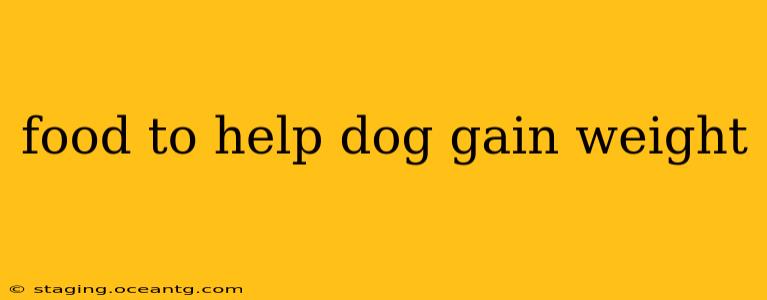Is your canine companion looking a little too slender? A healthy weight is crucial for your dog's overall well-being, impacting everything from energy levels to their immune system. If your vet has determined your dog needs to gain weight, understanding the right foods and feeding strategies is key. This comprehensive guide explores the best foods to help your dog pack on healthy pounds, addressing common concerns and offering expert advice.
What Causes Weight Loss in Dogs?
Before diving into food options, it's crucial to understand why your dog might be underweight. Underlying health issues can contribute to weight loss, so a visit to your veterinarian is the first and most important step. Possible causes include:
- Parasites: Internal parasites like worms can rob your dog of vital nutrients, leading to weight loss.
- Metabolic disorders: Conditions like hypothyroidism can affect metabolism and lead to weight loss.
- Dental problems: Painful teeth or gum disease can make eating difficult.
- Chronic illness: Diseases like kidney disease or cancer can contribute to weight loss.
- Insufficient caloric intake: Simply not eating enough can lead to weight loss, often due to picky eating habits.
- Increased caloric expenditure: Highly active dogs might need a higher calorie intake to maintain a healthy weight.
What Kind of Food Should I Feed My Dog to Help Them Gain Weight?
Once your vet has ruled out any underlying medical conditions, you can focus on dietary changes. The goal is to increase calorie intake without compromising nutritional balance. Here are some food options:
-
High-calorie dog food: Look for dog foods specifically formulated for weight gain. These often have a higher fat content, providing more calories per serving. Read the label carefully and choose a food that meets your dog's age and breed-specific needs. Consider foods with added calories from healthy fats like chicken fat or fish oil.
-
Wet food: Wet food generally has a higher calorie density than dry kibble, making it a good option for weight gain. It also often has a more appealing aroma and texture for picky eaters.
-
Adding healthy fats: You can supplement your dog's diet with healthy fats like plain, unsweetened yogurt (check for xylitol, which is toxic to dogs!), cooked sweet potato, or a small amount of olive oil or coconut oil (in moderation). Always consult your vet before adding supplements.
-
Frequent smaller meals: Instead of two large meals, try feeding your dog several smaller meals throughout the day. This can be particularly helpful for dogs with sensitive stomachs or those who are prone to vomiting.
What are Some Healthy High-Calorie Treats for Weight Gain?
Treats can be a helpful supplement to your dog's regular food to boost caloric intake, but moderation is key to avoid health problems associated with obesity. Choose treats that are high in calories and protein:
- Cooked chicken or beef: Small pieces of cooked, lean meat can be a tasty and nutritious addition.
- Plain cooked sweet potato: A good source of carbohydrates and fiber.
- Peanut butter (xylitol-free!): A spoonful of xylitol-free peanut butter can be a great calorie booster. Always check the label!
How Can I Tell if My Dog is Gaining Weight Healthily?
Regularly monitoring your dog's weight and body condition is crucial. You should see gradual weight gain, and your vet can help you track progress and make adjustments to the feeding plan as needed. Don't rush the process; steady, healthy weight gain is the goal.
What if My Dog is Still Not Gaining Weight?
If your dog isn't gaining weight despite dietary changes, it's essential to consult your veterinarian again. They may perform additional tests to rule out any underlying medical conditions or recommend further dietary adjustments or supplements.
What Foods Should I Avoid Feeding My Dog to Help Them Gain Weight?
While focusing on adding calories, it's equally important to avoid foods that could hinder weight gain or be detrimental to your dog's health:
- Foods high in fillers: These provide minimal nutritional value and won't help your dog gain weight healthily.
- Foods high in sugar: Excess sugar can lead to health problems.
- Toxic foods: Avoid foods like chocolate, onions, garlic, grapes, and raisins, which are toxic to dogs.
This guide provides general information; always consult your veterinarian for personalized advice tailored to your dog's specific needs and health status. A collaborative approach between you and your vet will ensure your furry friend reaches and maintains a healthy weight.
